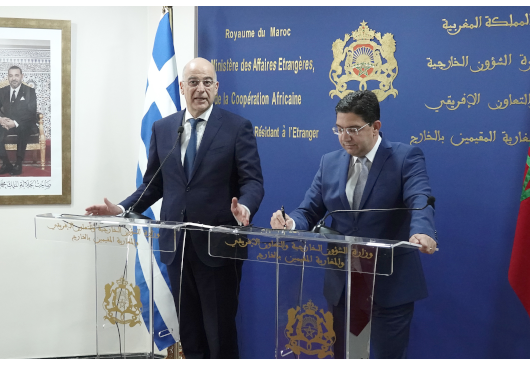 Je vous remecie, Monsieur le Ministre,
Je vous remecie, Monsieur le Ministre,
I would like to thank my colleague, Minister Bourita, for his very kind words. I am pleased to be here in Morocco, a country with which we enjoy historical ties.
Today, we explored ways of bolstering our bilateral political and economic relations, including in areas such as trade, tourism, agriculture, maritime transportation, discussions between enterprises of both countries, cooperation in the Balkans and in Africa.
We also exchanged views on our cooperation on a number of regional and international issues, pertaining to the Mediterranean and to North Africa, as well as to Morocco’s relations with the EU.
We would like Morocco to use our good services in their relations with the EU and would be very happy to help Morocco get even closer to the EU.
I am very pleased that Greece and Morocco share a common perspective on those issues. But also and, importantly, to note both our countries’ commitment to always remain within the context of International Law in our foreign relations.
We have particularly focused, as it is obvious, on Libya. In that regard, we reiterate our support to the efforts of the UN Secretary General Special Representative Mr. Salame, whom I have met in Brussels just a few days ago, towards reaching a political solution.
We also hope that the upcoming Berlin Conference will achieve tangible progress in bringing this longstanding conflict to an end.
May I be allowed also to say that we, Greece, were greatly surprised that Morocco was not invited at the meeting in Berlin on Sunday. We can not forget that Morocco was the cardinal factor of the Skhirat Agreement, which after eight months of hard work which you elaborated upon, Mr. Minister, was achieved. And all this experience now will not be present in Berlin.
In Libya, we have been witnessing a sharp rise in instability and an unprecedented escalation of provocations by Turkey, which have already left their illegal footprint, similarly to what happened in Iraq, in Syria and in Cyprus. I think this is a serious source of concern to all countries in the region.
I have to clearly say that the agreements signed by Turkey and Mr. Sarraj are entirely out of the scope of international law. They are null and void and produce no legal effects, whatsoever. Needless to say, they are beyond the Skhirat Agreement, which they clearly violate. They constitute an attempt to usurp the sovereign rights of third countries in the Mediterranean, while seriously undermining stability in Libya and in the wider region, and jeopardize the neighboring countries’ security.
As I said before, they violate the Skhirat Agreement, Libya’s national legal foundations, as well as international law and norms.
What is more, Turkey’s decision to deploy troops on Libyan soil is a violation of the sovereignty of a member of the UN and of the relevant UN Security Council Resolutions.
Greece welcomes the major reforms carried out by King Mohammed VI in a dynamic of openness, progress and modernity, through the conception of an adapted and renovated development model and the promotion of an advanced regionalisation. Greece welcomes Morocco’s role, under the ledership of the King on the regional and international levels, as a provider of stability and peace and a vector of growth and development in the region and in all of Africa. We support the UN efforts to reach a fair, realistic, lasting and mutually acceptable solution to the issue of Western Sahara, in accordance with the relevant UN Resolutions.
We also encourage all parties to continue their engagement in a spirit of realism and compromise.
To this end, Greece considers the Moroccan initiative submitted to the UN as a serious and credible approach for reaching a solution to the problems.
Regarding the European Union, Greece welcomes the recent renewal of the agricultural and fisheries agreements between Morocco and the EU. My colleague, His Excellency, made a clear remark on this. We also underline our support to the declaration of the Association Council of June 2019. Closer ties between the EU and Morocco have been proven mutually beneficial. We hope they will continue to be further enhanced in the future and Greece will do its part in this process.
My dear Colleague, thank you very much for hosting us here today. And kindly allow me to say, I am hoping to see you soon in Athens.
Thank you very much.
JOURNALIST: [Inaudible]
N. DENDIAS: Thank you for this question, I have touched upon this on my initial remark.
First of all, we support every effort to bring this conflict into a conclusion and really establish peace and stability in Libya and the region. The agreement in Moscow failed to do that and we hope that Berlin could achieve something more. Although I have to say, as I said before, that we cannot understand why Greece is not a part of this process but even more we cannot understand why Morocco was not called in Berlin, after all the hard work that Morocco has done. And it was very successful work, if I may say so, because the only tangible result of all these efforts on Libya is the Skhirat Agreement. Unfortunately, neither we nor Morocco are present in Berlin.
We hope for the best.
We will see what happens there and we will discuss it afterwards.
On the issue of the two memoranda signed between the government in Tripoli and Turkey, our clear position -which is also the position of the European Council and of the State Department – is that those agreements are null and void. They were signed in clear breach of the Skhirat Agreement, they do not serve peace and stability in the region and they do not even serve the interests of the Libyan people. I am not even sure of they serve Turkey’s true interests, but I am not the one that would be the judge of that.
January 15, 2020


